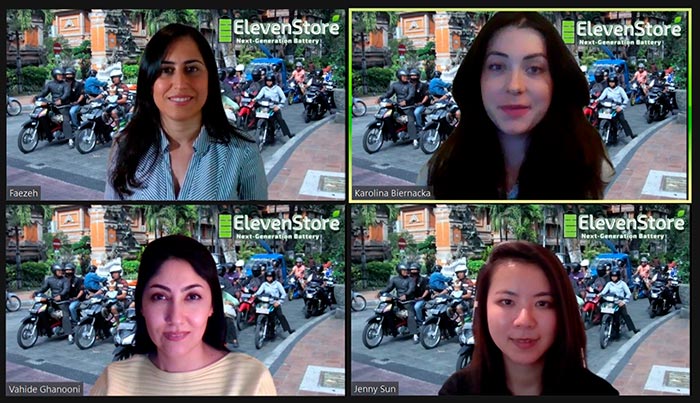A team of early-career researchers from Deakin University have won a global business competition for developing sodium batteries use for the electrification of low-cost transport, including scooters, buses and auto-rickshaws in Indonesia.
The ElevenStore team, based at Deakin University’s Institute for Frontier Materials, was one of two Australian teams selected to compete in the finals of the ClimateLaunchpad 2020 competition, gaining acceptance to the EIT Climate-KIC Accelerator to develop their battery system, as well as taking out the competition’s Theme Award for Sustainable mobility.
The team developed a low cost sodium battery technology, that seeks to compete as a low cost alternative to lithium batteries, using a material that is abundant and helps reduce the need for more toxic materials. The team said they would use the €5,000 prize (A$8,180), and participation in the accelerator program, to help progress their business plans.
The all-women team from ElevenStore is made up of early-career researchers, including PhD student Karolina Biernacka and the Institute for Frontier Materials’ Dr Faezeh Makhlooghi Azad, Dr Jenny Sun and Dr Vahide Ghanooni Ahmadabadi.
The team utilised a ‘cutting-edge’ sodium battery technology that had been developed by researchers at Deakin University. Sodium can be used in the production of batteries, playing a similar role to that of lithium.
Sodium is a highly abundant material, and has the potential to be sourced at a significantly lower price to lithium, but has some trade-offs with respect to the density of energy storage.
The team sought to use the innovation in the production of batteries for transport systems in Indonesia, seeing the battery research developed at Deakin University used to enable electric transport and reduce emissions into emerging markets, including Indonesia.
“We are all passionate about clean energy and want to have a positive impact on the environment,” Biernacka said.
“Our proposed sodium battery technology is composed of safe, sustainable, environmentally-friendly, earth-abundant and cheap raw materials. By employing the electrolyte technology developed at Deakin, it can also outperform traditional rechargeable batteries in terms of safety, cost and exceptional thermal stability.”
The team said that the sodium based batteries would be ideal for use in countries like Indonesia, that currently sees a high level of personal transport use, including vehicles like scooters and buses, that could both be electrified using the sodium batteries.

“The indications are that this technology will be perfect for application in Indonesia. We are planning to significantly reduce CO2 emissions in Indonesia by electrifying their scooters, with Indonesia being the third largest market in the world for scooters,” Biernacka added.
“The Indonesian Government has set a goal of replacing 20 per cent of its current energy sources with renewable energy by 2025. We have spoken already with Indonesian businesses keen to get this off the ground.”
A second Australian team, the Sydney-based Localcycle, also successfully progressed to the finals of the ClimateLaunchpad 2020 competition, which established a ‘closed-loop’ business focused on the collection and re-use of organic waste produced by Sydney cafes.
ElevenStore team member Karolina Biernacka said participation in the competition had helped the team how technologies can be converted from research to real-world applications.
“Participating in the Launchpad has been empowering,” Biernacka said. “It’s helped us to understand the translation of technology from the lab into reality and show other young researchers they can step out of the lab.
“Our goal is not only to spin out a technology that has the ability to change many lives, while also substantially reducing greenhouse gas emissions, but also to inspire and empower other young women to actively pursue their dreams.”


